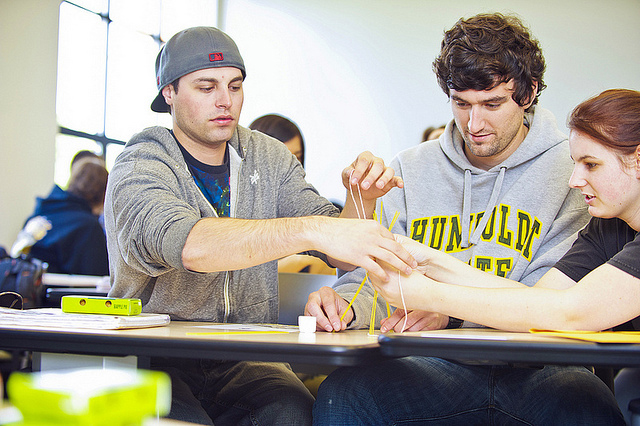The International Assembly for Collegiate Business Education (IACBE) gave its stamp of approval recently, accrediting both programs in the School of Business--Bachelor of Science in Business Administration with concentrations in Accounting; Finance; International Business; Management and Marketing; and the MBA program.

“We’ve been working on this for the last few years by ensuring the quality and value of education here. So professional accreditation is a very important milestone for us,” said Department Chair Harinder Singh.
To achieve accreditation, the business school had to meet various criteria, including developing and implementing an effective outcome assessment (i.e., the quality of a student’s work), a standard that accrediting bodies are taking into consideration when evaluating business schools, said Singh.
The path to accreditation began in 2011, when the school embarked on its overhaul. Over time, the school expanded its programs thanks to donor support. Giving a total of nearly $1 million in 2011, the Smullin Foundation and an anonymous donor helped the School of Business begin to hire new faculty in order to emphasize hands-on learning through internships and sustainability in the MBA program.
Singh said the internships, designed for undergraduates and graduates, present a unique opportunity for both students and the organizations they’re helping. Students are paid by the university—not businesses—to come up with a tangible and useful asset. In turn, businesses receive a valuable service.
“It’s a win-win situation,” said Singh. “Students gain practical experience, while the businesses wind up with a marketing plan, for example, that would otherwise be costly.”
In the process, students learn to push themselves, said Assistant Professor Nancy Vizenor, who teaches marketing, management, and entrepreneurship. “Students don’t realize they can meet our high expectations, but they rise to the occasion. I think it probably surprises them.”
The school also added sustainability to the MBA program. HSU is now one of many universities that offer a “green” MBA, which teaches students to see business through the lens of social and environmental responsibility.
“We felt sustainability would align with the overall mission at HSU,” said Assistant Professor and Graduate Coordinator David Sleeth-Keppler, who was one of the new hires. “If we ignored sustainability, then we’re not preparing students for a changing world.
"At the same time we’re about teaching our grad students to help businesses protect the bottom line while being socially responsible."
Alum Kyle McKeown (’14), among the first group of graduates of the green MBA program, praised the type and quality of classes. “Instead of learning traditional business tools and frameworks, I learned different ways in which businesses can approach sustainability like finance, marketing, and ethics.”
McKeown is currently the general manager for Arcata Countertops and was able to pinpoint manufacturers that produce green-friendly countertops. He now provides customers with products that are Leadership in Energy and Environmental Design (LEED) certified and meet Cradle to Cradle Innovation Institute standards. In doing so, customers expand their knowledge of sustainable products that are available to every consumer, he said.
In the end, the school’s overhaul has paid off in more ways than one. It received not only accreditation, but also praise. In the accreditation letter, the IACBE commended the focus on strategic sustainability and bringing the program into alignment with the values of HSU, and the hiring of new faculty, said Singh.
HSU’s business school is one of the largest majors on campus–and its future is bright. Currently there are close to 600 students enrolled in both programs. Enrollment has increased steadily, so has diversity as the school continues to attract more international students, said Singh.
“We want to be a destination school for business sustainability and hands-on learning,” said Singh.